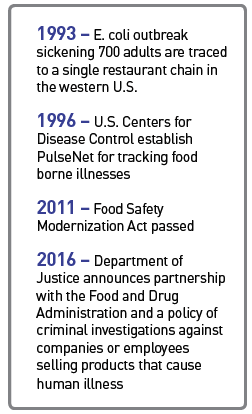

Jun 18, 2018Criminal charges in toolbox for FSMA enforcement


Shawn Stevens is an attorney and a founding member of the Food Industry Counsel, a legal consulting firm that works exclusively with the food industry to comply with Food and Drug Administration (FDA) and United States Department of Agriculture (USDA) food safety regulations. He spoke in April at the Safe Food California conference on the topic, “Modern Food Safety Expectations and Responsibilities for Executive Leaders.”
While FSMA is the most current reform of food safety law, Stevens said it’s also the product of a decades-long “food safety revolution” that’s been going on since the 1993 outbreak of foodborne illness linked to E. coli at a restaurant chain in the western United States.
“After Jack-In-The-Box, we moved to a system of mandated reporting,” Stevens said. The addition of more technology in following years has toughened food safety standards. One example is the introduction in 1996 of PulseNet technology for matching DNA of bacteria from patients to identify connected outbreaks.
“Once we had a surveillance system to detect outbreaks, we started hearing about a lot of outbreaks in the news,” Stevens said. “That made companies really nervous, so they started doing a lot of testing of their incoming ingredients, of their products, and the FDA said they wanted a piece of that, so they created what’s called the Reportable Food Registry.”
Even in cases where disease does not break out, publicized product recalls have increased public awareness of potential foodborne disease.
The latest development of the food safety emphasis is FSMA and what is in essence a zero-tolerance policy for foodborne illnesses, Stevens said.
“It’s Congress’ way of telling the FDA to make foodborne illness stop,” he said.
Perhaps the biggest change FSMA has brought is that it is allowing criminal charges to be leveled against executives tied to food safety issues.
“With FSMA, and the FDA being commanded to make foodborne illness stop, the agency shifted gears and it adopted this zero-tolerance mentality where the agency has now said: ‘We will not now tolerate foodborne illness. We will not tolerate foodborne illness outbreaks. And if your foods are associated with an outbreak, or if your foods make people sick, we may bring criminal sanctions against you,’” Stevens said. “That’s a huge policy shift, with the DOJ (Department of Justice) and FDA sort of adopting that stance,” he said.
Corporate officials can be held responsible under a legal precedent known as the Park Doctrine. Officials can be charged if 1) there was a condition present that could lead to food contamination and people getting sick; 2) if the official was in a position to know of and correct or fix the condition; 3) if they failed take action. Individuals convicted of such charges face up to a year in prison or a $250,000 fine.
Another outcome of FSMA is the FDA conducting what Stevens calls “swab-a-thons”– taking hundreds of swabs from food production areas looking for pathogens.
“If they find any, they’re going to tease out the DNA, and then compare it against this database, to see if it matches any human illness,” he said. And if it does match, the FDA and DOJ could initiate a criminal investigation.
Several criminal investigations have been announced against major food companies, including Chipotle and Dole, although Stevens said on March 21 that actual charges have not yet been filed in those cases. Dole said in statements to media it had started its own investigation and was cooperating with the criminal investigation. Chipotle has posted an open letter on its website detailing measures the company has taken to improve food safety since a 2015 outbreak.
But the food safety rules run from field to fork, and growers are not exempt from prosecution. In one high-profile case, two Colorado cantaloupe growers pleaded guilty for their role in a 2011 outbreak of listeria. The U.S. Centers for Disease Control and Prevention reported 33 people died as a result of the outbreak. The growers avoided prison but were sentenced to parole, community service and restitution.
“Every person working for a food company could face criminal charges, if they are directly and knowingly involved in contamination or people getting sick,” Stevens said. “But usually the circumstances that lead to product contamination or people getting sick are either caused by or could be prevented by the executives or upper management, and that is where the government will focus.”
So how do growers steer clear of product recalls, foodborne illness and legal entanglements?
“The easy answer is, really get to know the new regulations and make sure you’re following them closely,” Stevens said. “And if you’re not sure what the new requirements are, or whether they apply to you, be sure to ask for help.”
Recall insurance products are available but won’t cover any criminal exposure of a business or individual. Compliance, Stevens said, is the best policy.
“When we look at pathogens, one of the biggest misconceptions in my view, is that it’s easy to control pathogens in the processing environment,” Stevens said. “It’s not. Outbreak after outbreak after recall after recall, we are now discovering that very sophisticated companies, who believed they had very sophisticated pathogen control programs, are finding themselves recalling large amounts of product produced over very long periods of time. So pathogens, in my view, are much more persistent than we once thought. And the industry really needs to redouble its efforts to control for that in the environment.”
– Stephen Kloosterman, VGN Assistant Editor














